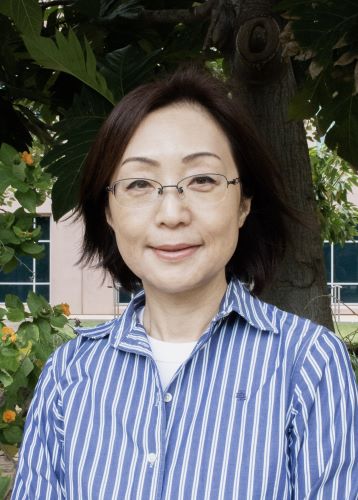Yukiko Yamazaki studied veterinary medicine and obtained her Master of Veterinary Science in 1985 at Rakuno Gakuen University in Hokkaido, Japan. Yuki studied in vitro maturation and in vitro fertilization of murine follicular oocytes at Kitasato University and received her Ph.D. in Agriculture in 1990. Then, she did postdoctoral training at the Mitsubishi Kasei Institute of Life Sciences and the National Institute for Physiological Science in Japan. During this period, Yuki worked on a gene trapping system with embryonic stem cells and in vivo gene transfer to mouse spermatogenic cells. In 1999, Yuki joined Dr. Ryuzo Yanagimachi’s lab at the John A. Burns School of Medicine at the University of Hawaii (JABSOM UH) as a visiting researcher to study mouse cloning. She was recruited as an Assistant Research Professor (2001) and Assistant Professor (2006) in the Department of Anatomy, at Biochemistry, and Physiology at JABSOM UH. Yuki was promoted to Associate Professor (with tenure) in 2013. Since the Institute for Biogenesis Research (IBR) was established in 2000, Yuki has worked as a member of IBR (renamed Yanagimachi IBR in July 2024).
Dr. Yamazaki has been working in the field of reproductive biology and assisted reproductive technologies. Her research interests include germ cell differentiation and oocyte developmental competence. Using nuclear transfer technology, Yuki investigated the nuclear reprogramming of fetal germ cells at different sexes and stages. She also studied sex differentiation of fetal germ cells in vitro. Sorted XX and XY germ cells were cultured under various conditions to define the factors regulating their sex fates. For these studies, Yuki investigated the epigenetic reprogramming of imprinted genes to define initial sex differentiation of male and female germ cells.
Dr. Yamazaki’s present research is to develop an in vitro follicle growth system to generate fertilizable follicular oocytes. It is one of promising technologies to preserve fertility for cancer patients. Yuki’s team established a 3-D ovarian tissue culture system supported by Matrigel. This system successfully promoted antral follicle growth and oocyte developmental competence compared with conventional 2-D culture. They obtained full-term offspring from these oocytes after IVF and embryo transfer. Recently Yuki developed a novel 3-D model supported by bioinert hydrogel to define the roles of individual molecules in follicle growth. The Yamazaki lab has been analyzing the molecules selected by this model system.
Matsushige C, Kitazumi K, Beaman A, Miyagi M, Michelle D. Tallquist, Yamazaki Y. RGD peptide promotes follicle growth through integrins ⍺vβ3/⍺vβ5 in three-dimensional culture. Reproduction 2024; 169 e240151 (PMID: 39441765)
Matsushige C, Xu X, Miyagi M, Zuo YY, Yamazaki Y. RGD-modified dextran hydrogel promotes follicle growth in three-dimensional ovarian tissue culture in mice. Theriogenology 2022; 183, 120-131. (PMID: 35247849)
Kim SM, Yokoyama T, Ng D, Ulu F, Yamazaki Y. Retinoic acid-stimulated ERK1/2 pathway regulates meiotic initiation in cultured fetal germ cells. PLOS One 2019;14(11), e0224628 (PMID:31682623).
Ulu F, Kim SM, Yokoyama T, Yamazaki Y. Dose-dependent functions of FGF9 regulate the fate of murine XY primordial germ cells (PGCs). Biology of Reproduction 2017; 96, 122-133. (PMID: 28395336)
Higuchi CM, Maeda Y, Horiuchi T, Yamazaki Y. A simplified method for three-dimensional (3-D) ovarian tissue culture yielding oocytes competent to produce full-term offspring in mice. PLoS One 2015; 10, e0143114 (PMID: 26571501)
Ohta K, Yamamoto M, Lin Y, Hogg N, Akiyama H, Behringer RR, Yamazaki Y. Male differentiation of germ cells induced by embryonic-age-specific Sertoli cells in mice. Biology of Reproduction 2012; 86, 112, 1-11. (PMID: 22262692)
Iwahashi K, Yoshioka H, Low EW, McCarrey JR, Yanagimachi R, Yamazaki Y. Autonomous regulation of sex-specific developmental programming in mouse fetal germ cells. Biology of Reproduction 2007; 77, 697-706. (PMID: 17615405)
Yamazaki Y, Low EW, Marikawa Y, Iwahashi K, Bartolomei MS, McCarrey JR, Yanagimachi R. Adult mice cloned from migrating primordial germ cells. Proc. Natl. Acad. Sci. USA 2005; 102, 11361-11366. (PMID: 16055553)
Yamazaki Y, Mann MRW, Lee SS, Marh J, McCarrey JR, Yanagimachi R, Bartolomei MS. Reprogramming of primordial germ cells begins before their migration into the genital ridge making primordial germ cells inadequate nuclear donors for reproductive cloning. Proc. Natl. Acad. Sci. USA 2003; 100: 12207- 12212. (PMID: 14506296)
